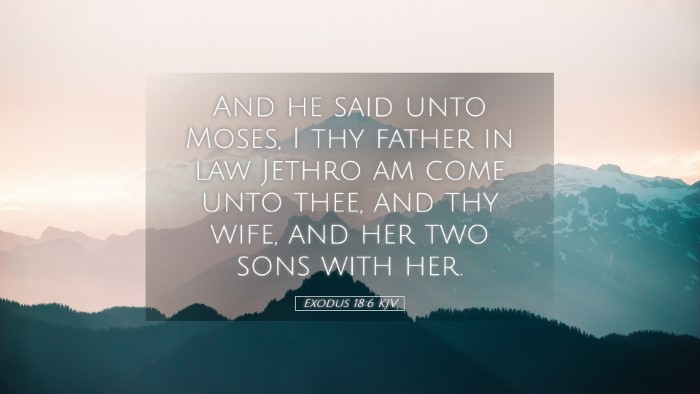Exodus 18:6 Commentary
Verse Context: Exodus 18:6 states, "And when Moses' father-in-law saw all that he did to the people, he said, 'What is this thing that thou doest to the people? why sittest thou thyself alone, and all the people stand before thee from morning unto even?'" This dialogue unfolds during a critical period when Moses, having led the Israelites out of Egypt, faces the overwhelming task of governance and leadership over a vast community.
Historical Background
Matthew Henry’s Perspective: In his commentary, Matthew Henry emphasizes the significance of Jethro’s visit, noting that it illustrates both the wisdom of godly counsel and the need for governance in community settings. Jethro, a Midianite priest, represents a connection between Moses and the surrounding nations, offering insights into leadership that contrast with the roles Moses had been playing.
Albert Barnes’ Insights: Barnes elaborates on the historical setting, explaining how Jethro's observations are crucial for Moses to understand the gravity of his leadership role. Jethro’s inquiry poses a vital question about the sustainability of Moses’ approach and points toward the necessity of delegation in leadership, which becomes essential for effective governance.
Leadership and Governance
Adam Clarke’s Commentary: Clarke highlights how Moses’ role as the sole judge for the people posed not only a physical burden but also a spiritual one. The weight of judging the people's disputes single-handedly can be overwhelming and may lead to a breakdown in both judgment and communication. Moses' leadership style reflects a common pitfall where leaders isolate themselves rather than build a supportive structure around them.
Lessons in Delegation
Matthew Henry on Delegation: Henry notes that this exchange between Jethro and Moses serves as an essential lesson in delegation. Jethro conveys to Moses that he cannot bear the entire load by himself and teaches him the importance of appointing capable leaders to share responsibilities. This principle of delegation suggests that effective leaders recognize their limitations and empower others to act, thus promoting a healthier community structure.
- Understanding Limitations: Effective leaders must acknowledge their limits.
- Empowering Others: Sharing responsibilities enhances community resilience.
- Collective Wisdom: Diverse counsel can lead to better decision-making.
Spiritual Guidance
Albert Barnes – Spiritual Dimension: Barnes adds a spiritual layer, indicating that Jethro's advice transcends mere organizational strategy; it is about spiritual health within the community. When leaders delegate effectively, they not only foster growth among others but also model humility and wisdom, virtues that are essential in spiritual leadership.
Modern Application for Leaders
Moses' Example Today: The challenge Moses faced is relevant to modern church leadership and organization. Leaders often find themselves overwhelmed with demands, echoing Moses’ experience. The necessity for establishing structures, appointing associated leaders, and encouraging congregational participation mirrors the biblical principle encapsulated in Jethro’s counsel.
Conclusion
Summation: The dialogue in Exodus 18:6 invites a profound examination of leadership practices within both historical and contemporary contexts. Through Jethro’s intervention, we learn that leadership requires more than personal strength; it demands collaboration, humility, and a willingness to share burdens. This passage remains a timeless resource for pastors, theologians, and anyone invested in effective spiritual and community leadership.
Reflection Questions for Leaders:
- How can I implement delegation in my leadership model?
- What structures can I create to prevent burnout within my team?
- Am I open to receiving counsel from others in my ministry?


